Related Research Articles

The First Chechen War, also referred to as the First Russo-Chechen War, was a struggle for independence waged by the Chechen Republic of Ichkeria against the Russian Federation from 11 December 1994 to 31 August 1996. This conflict was preceded by the battle of Grozny in November 1994, during which Russia covertly sought to overthrow the new Chechen government. Following the intense Battle of Grozny in 1994–1995, which concluded with a pyrrhic victory for the Russian federal forces, Russia's subsequent efforts to establish control over the remaining lowlands and mountainous regions of Chechnya were met with fierce resistance and frequent surprise raids by Chechen guerrillas. The recapture of Grozny in 1996 played a part in the Khasavyurt Accord (ceasefire), and the signing of the 1997 Russia–Chechnya Peace Treaty.
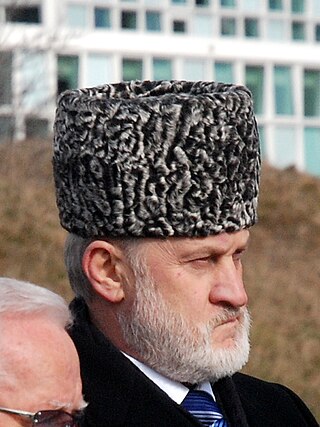
Akhmed Halidovich Zakayev is a Chechen statesman, political and military figure of the unrecognised Chechen Republic of Ichkeria (ChRI). Having previously been a Deputy Prime Minister, he now serves as Prime Minister of the ChRI government-in-exile. He was also the Foreign Minister of the Ichkerian government, appointed by Aslan Maskhadov shortly after his 1997 election, and again in 2006 by Abdul Halim Sadulayev. An active participant in the Russian-Chechen wars, Zakayev took part in the battles for Grozny and the defense of Goyskoye, along with other military operations, as well as in high-level negotiations with the Russian side.

Akhmat-Khadzhi Abdulkhamidovich Kadyrov was a Russian politician and revolutionary who served as Chief Mufti of the Chechen Republic of Ichkeria in the 1990s during and after the First Chechen War. At the outbreak of the Second Chechen War he switched sides, offering his service to the Russian government, and later became the President of the Chechen Republic from 5 October 2003, having acted as head of administration since July 2000.

Shamil Salmanovich Basayev, also known by his kunya "Abu Idris", was a Chechen guerilla leader who served as a senior military commander in the breakaway Chechen Republic of Ichkeria. He held the rank of brigadier general in the Armed Forces of Ichkeria, and was posthumously declared generalissimo. As a military commander in the separatist armed forces of Chechnya, one of his most notable battles was the separatist recapture of Grozny in 1996, which he personally planned and commanded together with Aslan Maskhadov. He also masterminded several of the worst terrorist attacks that occurred in Russia.

On 19 August 2002, a group of Chechen fighters armed with a man-portable air-defense system brought down a Russian Mil Mi-26 helicopter in a minefield, which resulted in the death of 127 Russian soldiers in the greatest loss of life in the history of helicopter aviation. It is also the deadliest aviation disaster ever suffered by the Russian Armed Forces, as well as its worst loss of life in a single day since the 1999 start of the Second Chechen War.
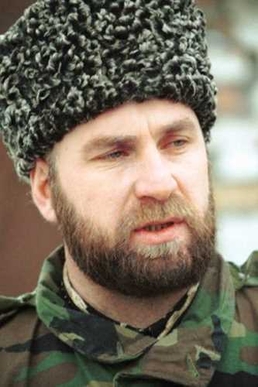
Ruslan (Khamzat) Germanovich Gelayev was a prominent commander in the Chechen resistance movement against Russia, in which he played a significant, yet controversial, military and political role in the 1990s and early 2000s. Gelayev was commonly viewed as an abrek and a well-respected, ruthless fighter. His operations spread well beyond the borders of Chechnya and even outside the Russian Federation and into Georgia. He was killed while leading a raid into the Russian Republic of Dagestan in 2004.
Khadzhi-Murat Yandiyev (Yandiev) was an Ingush insurgent fighter, who disappeared in February 2000 after being filmed in the company of a Russian Army general who ordered him to be taken away and shot. To this date, his body has not been found.
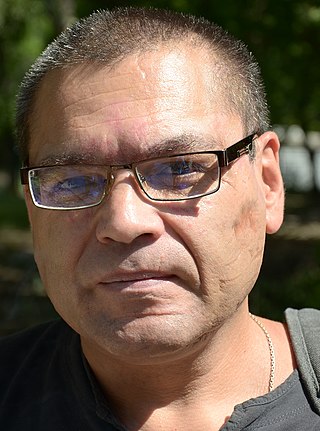
Andrei Maratovich Babitsky was a Russian journalist and war reporter, who worked for Radio Free Europe/Radio Liberty (RFE/RL) from 1989 to 2014, covering the 1991 August Coup, Civil War in Tajikistan and both the First and Second Chechen Wars from behind Chechen lines. Babitsky's kidnapping by the Russian forces in January–February 2000 during the Second Chechen War attracted attention of international journalists' organisations. His 2005 video interview with Chechen warlord Shamil Basayev was condemned by Russian government, as Basayev was on wanted terrorist list in Russia.

In Chechnya, mass graves containing hundreds of corpses have been uncovered since the beginning of the Chechen wars in 1994. As of June 2008, there were 57 registered locations of mass graves in Chechnya. According to Amnesty International, thousands may be buried in unmarked graves including up to 5,000 civilians who disappeared since the beginning of the Second Chechen War in 1999. In 2008, the largest mass grave found to date was uncovered in Grozny, containing some 800 bodies from the First Chechen War in 1995. Russia's general policy to the Chechen mass graves is to not exhume them.
Human rights violations were committed by the warring sides during the second war in Chechnya. Both Russian officials and Chechen rebels have been regularly and repeatedly accused of committing war crimes including kidnapping, torture, murder, hostage taking, looting, rape, decapitation, and assorted other breaches of the law of war. International and humanitarian organizations, including the Council of Europe and Amnesty International, have criticized both sides of the conflict for blatant and sustained violations of international humanitarian law.
Sergei (Sergey) Lapin, also known by his radio communications call sign Kadet ("Cadet"), is a former Russian police officer who had served in Grozny, Chechnya as a Lieutenant in the OMON from the Khanty–Mansi Autonomous Okrug. He has been convicted for the torture and "disappearance" of a Chechen student.

Mikhail Yuryevich Malofeyev was a Russian major general who served in the Russian Ground Forces from 1977 until his death. Initially serving as a platoon commander under the Group of Soviet Forces in Germany, he served in multiple military districts and theatres including service in the First Chechen War, rising through the ranks before becoming a major general in June 1999 and deputy chief of the Combat Training Directorate of the Leningrad Military District a month later.

The Presidential Palace in Grozny was a building in the center of the Chechen capital Grozny. The building became a symbol of resistance for the supporters of the Chechen Republic of Ichkeria during the early stages of the conflict in Chechnya. The building was damaged by repeated artillery and air strikes. The Russian army demolished it completely in 1996.

Zelimkhan Murdalov was a student from Grozny, Chechnya, who left his home on 2 January 2001, saying he would return but never did. His parents tracked him down at the police station, where an official promised that he would soon be released, but they have not seen their son since. According to witnesses, Murdalov was subsequently severely tortured while in police custody. His case was first brought to the public prominence by the September 2001 Novaya Gazeta article "The Disappearance" by Anna Politkovskaya.
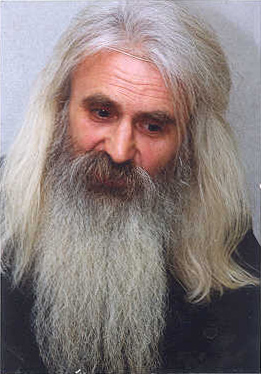
Viktor Alekseyevich Popkov was a Russian dissident, Christian, humanitarian, human rights activist and journalist.
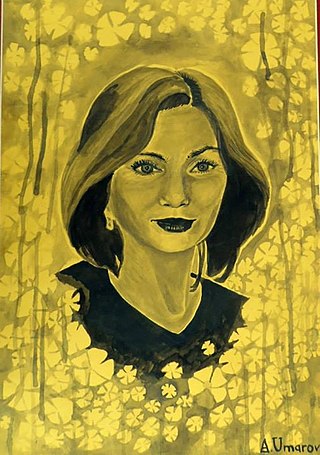
Natalya Khusainovna Estemirova was a Russian human rights activist and board member of the Russian human rights organization Memorial. Estemirova was abducted by unknown persons on 15 July 2009 around 8:30 a.m. from her home in Grozny, Chechnya, as she was working on "extremely sensitive" cases of human rights abuses in Chechnya. Two witnesses reported they saw Estemirova being pushed into a car shouting that she was being abducted. Her remains were found with bullet wounds in the head and chest area at 4:30 p.m. in woodland 100 metres (330 ft) away from the federal road "Kavkaz" near the village of Gazi-Yurt, Ingushetia.
Musa Kaimovich Muradov is an ethnic Chechen Russian journalist. In 2003, he was awarded the International Press Freedom Award of the Committee to Protect Journalists for his reporting on the Second Chechen War.
The Disappearance of Ali Astamirov concerns a Chechen journalist who was working for Agence France Presse in Ingushetia, Russia, bordering Chechnya, when he was kidnapped at gunpoint by a group of three, uniformed, masked men on 4 July 2003, just outside Nazran. This was during the Second Chechen War.
On the early morning of August 11, 2009, the bodies of Zarema Sadulayeva and Alik Dzhabrailov were found in a car trunk on the outskirts of the Chechen Capital of Grozny. Their bodies had traces of many bullets. Zarema Sadulayeva and Alik Dzhabrailov were kidnapped a day earlier, August 10 afternoon, from their work place, the office of non-profit organization Save the Generation, located in Grozny.
References
- ↑ Sulon, Bill (7 January 1999). "Still missing in Chechnya: Parents friends hoping for best". Pocono Record. Retrieved 5 September 2024.
- ↑ "Andrew Shumack Obituary (2015) - Easton, PA - The Express Times". Legacy.com. Retrieved 2024-09-05.
- ↑ St. Petersburg Press, "American goes missing in Chechnya," 1995
- ↑ "Refworld | Journalists Missing 1982-2009". Refworld. Retrieved 2017-06-12.